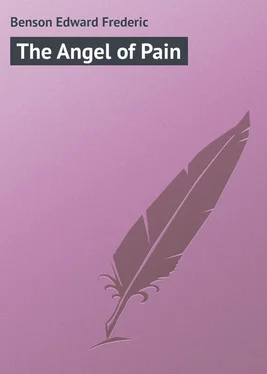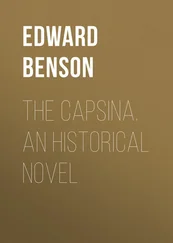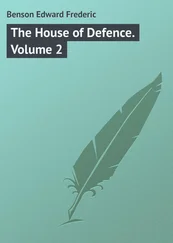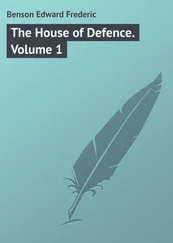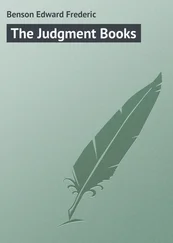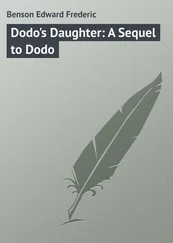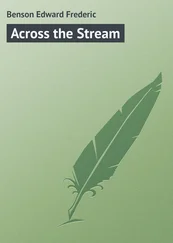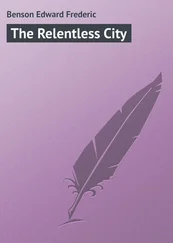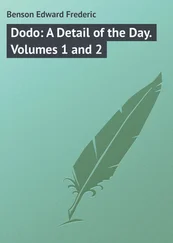Edward Benson - The Angel of Pain
Здесь есть возможность читать онлайн «Edward Benson - The Angel of Pain» — ознакомительный отрывок электронной книги совершенно бесплатно, а после прочтения отрывка купить полную версию. В некоторых случаях можно слушать аудио, скачать через торрент в формате fb2 и присутствует краткое содержание. Жанр: foreign_prose, на английском языке. Описание произведения, (предисловие) а так же отзывы посетителей доступны на портале библиотеки ЛибКат.
- Название:The Angel of Pain
- Автор:
- Жанр:
- Год:неизвестен
- ISBN:нет данных
- Рейтинг книги:5 / 5. Голосов: 1
-
Избранное:Добавить в избранное
- Отзывы:
-
Ваша оценка:
- 100
- 1
- 2
- 3
- 4
- 5
The Angel of Pain: краткое содержание, описание и аннотация
Предлагаем к чтению аннотацию, описание, краткое содержание или предисловие (зависит от того, что написал сам автор книги «The Angel of Pain»). Если вы не нашли необходимую информацию о книге — напишите в комментариях, мы постараемся отыскать её.
The Angel of Pain — читать онлайн ознакомительный отрывок
Ниже представлен текст книги, разбитый по страницам. Система сохранения места последней прочитанной страницы, позволяет с удобством читать онлайн бесплатно книгу «The Angel of Pain», без необходимости каждый раз заново искать на чём Вы остановились. Поставьте закладку, и сможете в любой момент перейти на страницу, на которой закончили чтение.
Интервал:
Закладка:
“No, dear Evelyn,” said Mrs. Home rather hastily, guessing what was coming.
“Then you are a very wicked woman; but as I now know you are going to tell an untruth, it will do just as well for my purpose. Now, is Philip engaged to Miss Ellington?”
“No, dear; indeed he is not,” said Mrs. Home.
“Oh, why not lie better than that?” said Evelyn.
Mrs. Home clasped her white, delicate little hands together.
“Ah, but it is true,” she said. “It really is literally true, as far as I know.”
Evelyn shook his head at her.
“But they have been gone half an hour,” he said. “You mean – I tell you, you mean that they may be now, for all you know.”
Mrs. Home turned her pretty, china-blue eyes on to him, with a sort of diminutive air of dignity.
“Of course you are at liberty to put any construction you please on anything I say,” she remarked.
“I am,” said he, “and I put that. Now, are you pleased at it?”
“She is charming,” said Mrs. Home, hopelessly off her guard.
“That is all I wanted to know,” said Evelyn. “But what a tangled web you weave, without deceiving me in the least, you old darling.”
Tom Merivale had not joined Evelyn, but strolled along the upper walk through herbaceous borders. He had not stayed away from his home now for the past year, and delighted though he was to see these two old friends of his again, he confessed to himself that he found the call on sociability which a visit tacitly implied rather trying. More than that, he found even the presence of other people in the house with whom he was not on terms of intimacy a thing a little upsetting, for his year of solitude had given some justification to his nickname. For solitude is a habit of extraordinary fascination, and very quick to grow on anyone who has sufficient interest in things not to be bored by the absence of people. And with Tom Merivale, Nature, the unfolding of flowers, the lighting of the stars in the sky, the white splendour of the moon, the hiss of the rain on to cowering shrubs and thirsty grass was much more than an interest; it was a passion which absorbed and devoured him. For Nature, to the true devotee, is a mistress far more exacting and far more infinite in her variety and rewards than was ever human mistress to her adorer. Tom Merivale, at any rate, was faithful and wholly constant, and to him now, after a year spent in solitude in which no man had ever felt less alone, no human tie or affection weighed at all compared to the patient devotion with which he worshipped this ever young mistress of his. To some, indeed, as to Mrs. Home, this cutting of himself off from all other human ties might seem to verge on insanity; to others, as to Philip, it might equally well be construed into an example of perfect sanity. For he had left the world, and cast his moorings loose from society in no embittered or disappointed mood; the severance of his connection with things of human interest had been deliberate and sanely made. He believed, in fact, that what his inner essential self demanded was not to be found among men, or, as he had put it once to Philip, it was to be found there in such small quantities compared to the mass of alloy and undesirable material from which it had to be extracted, that it was false economy to quarry in the world of cities. More than this, too, he had renounced, though this second renunciation had not been deliberate, but had followed, so he found, as a sequel to the other; for he had been a writer of fiction who, though never widely read, had been prized and pored over by a circle of readers whose appreciation was probably far more worth having than that of a wider circle could have been. Then, suddenly, as far as even his most intimate friends knew, he had left London, establishing himself instead in a cottage, of the more comfortable sort of cottages, some mile outside Brockenhurst. In the tea-cup way this had made quite a storm in the set that knew him well, those, in fact, by whom he was valued as an interpreter and a living example of the things of which he wrote. These writings had always been impersonal in note, slightly mystical, and always with the refrain of Nature running through them. But none, when he disappeared as completely as Waring, suspected how vital to himself his disappearance had been. Anything out of the way is labelled, and rightly by the majority, to be insane. By such a verdict Tom Merivale certainly merited Bedlam. He had gone away, in fact, to think, while the majority of those who crowd into the cities do so, not to think, but to be within reach of the distractions that leave no time for thought. For action is always less difficult than thought; a man can act for more hours a day than he can think in a week, and action, being a productive function of the brain, is thus (rightly, also, from the social point of view) considered the more respectable employment.
The subject of this difficult doctrine, however, was more than content; as he had said, he was happy, a state far on the sunward side of the other. He seemed to himself, indeed, to be sitting very much awake and alert on some great sunlit slope of the world, untenanted by man, but peopled with a million natural marvels unconjectured as yet by the world, but which slowly coming into the ken of his wondering and patient eyes. For a year now he had consciously and solely devoted himself to the study and contemplation of life, that eternal and ever-renewed life of Nature, and the joy manifested therein. He had turned his back with the same careful deliberation on all that is painful in Nature, all suffering, all that hinders and mars the fulness of life, on everything, in fact, which is an evidence of imperfection. In this to a large extent he was identically minded with Christian Scientists, but having faced the central idea of Christianity, namely, the suffering which was necessary as atonement for sin, he had confessed himself unable to accept, at present at any rate, the possibility of suffering being ever necessary, and could no longer call himself a Christian. Happiness was his gospel, and the book in which he studied it was Nature, omitting always such chapters as dealt with man. For man, so it seemed to him, had by centuries of evolution built himself into something so widely different from Nature’s original design, that the very contemplation of and association with man was a thing to be avoided. Absence of serenity, absence of happiness, seemed the two leading characteristics of the human race, whereas happiness and serenity were the chief of those things for which he sought and for which he lived.
This year’s solitude and quest for joy had already produced in him remarkable results. He had been originally himself of a very high-strung, nervous, and irritable temperament; now, however, he could not imagine the event which should disturb his equanimity. For this, as far as it went alone, he was perfectly willing to accept the possible explanation that a year’s life in the open air had wrought its simple miracle of healing on his nerves, and, as he had said to Lady Ellington, the perfection of health had eliminated the possibility of discontent.
But other phenomena did not admit of quite so obvious an interpretation; and it was on these that he based his belief that, though all that occurred must necessarily be natural, following, that is to say, laws of nature, he was experiencing the effects of laws which were to the rest of the world occult or unknown. For in a word, youth, with all its vivid vigour, its capacity for growth and expansion, had returned to him in a way unprecedented; his face, as Evelyn had noticed, had grown younger, and in a hundred merely corporeal ways he had stepped back into early manhood. Again, and this was more inexplicable, he had somehow established, without meaning to, a certain communion with birds and beasts, of which the “nightingale trick” had been a small instance, which seemed to him must be a direct and hitherto unknown effect of his conscious absorption of himself in Nature. How far along this unexplored path he would be able to go he had no idea; he guessed, however, that he had at present taken only a few halting steps along a road that was lost in a golden haze of wonder.
Читать дальшеИнтервал:
Закладка:
Похожие книги на «The Angel of Pain»
Представляем Вашему вниманию похожие книги на «The Angel of Pain» списком для выбора. Мы отобрали схожую по названию и смыслу литературу в надежде предоставить читателям больше вариантов отыскать новые, интересные, ещё непрочитанные произведения.
Обсуждение, отзывы о книге «The Angel of Pain» и просто собственные мнения читателей. Оставьте ваши комментарии, напишите, что Вы думаете о произведении, его смысле или главных героях. Укажите что конкретно понравилось, а что нет, и почему Вы так считаете.
